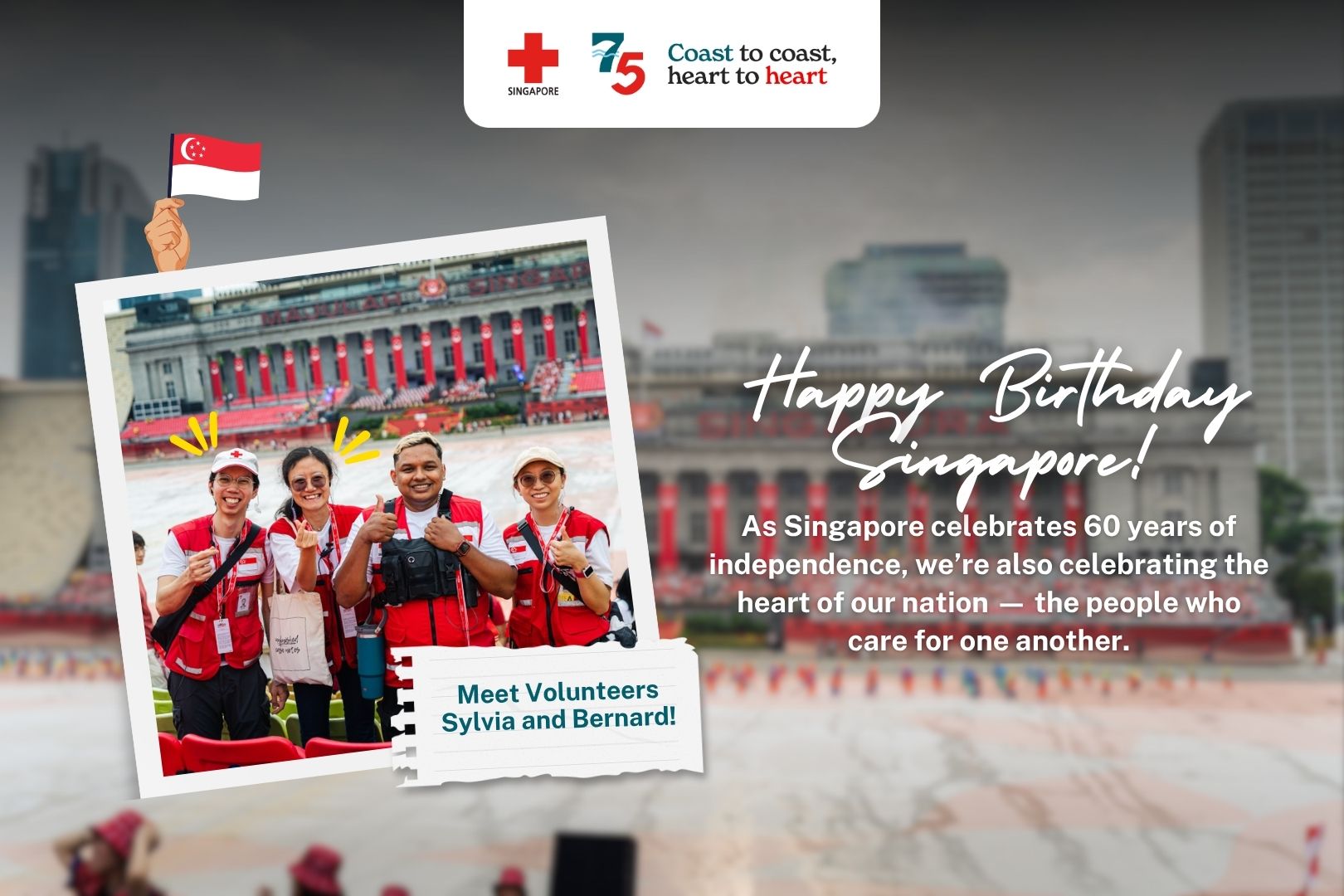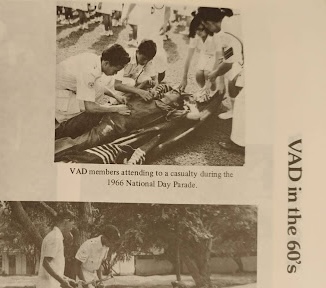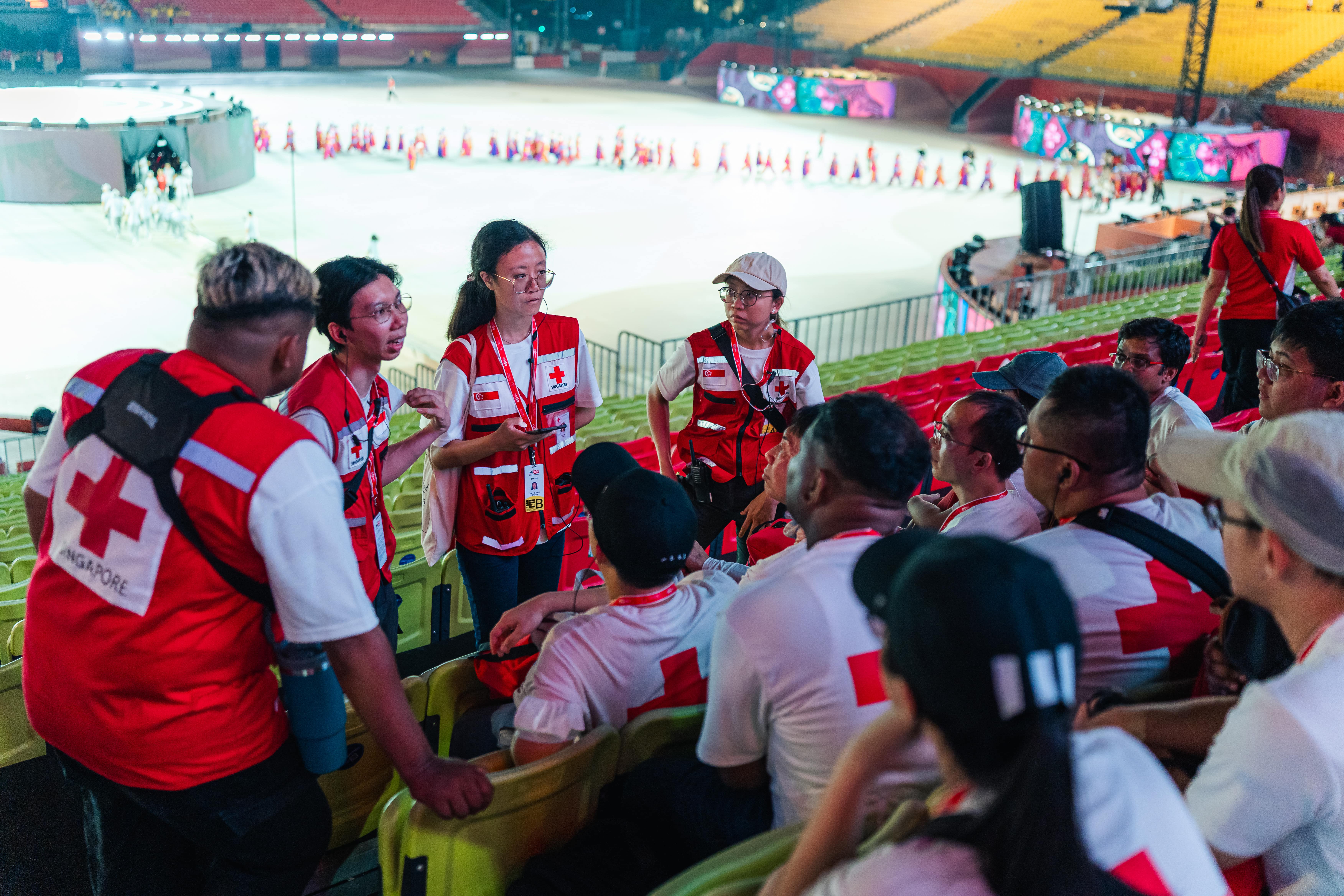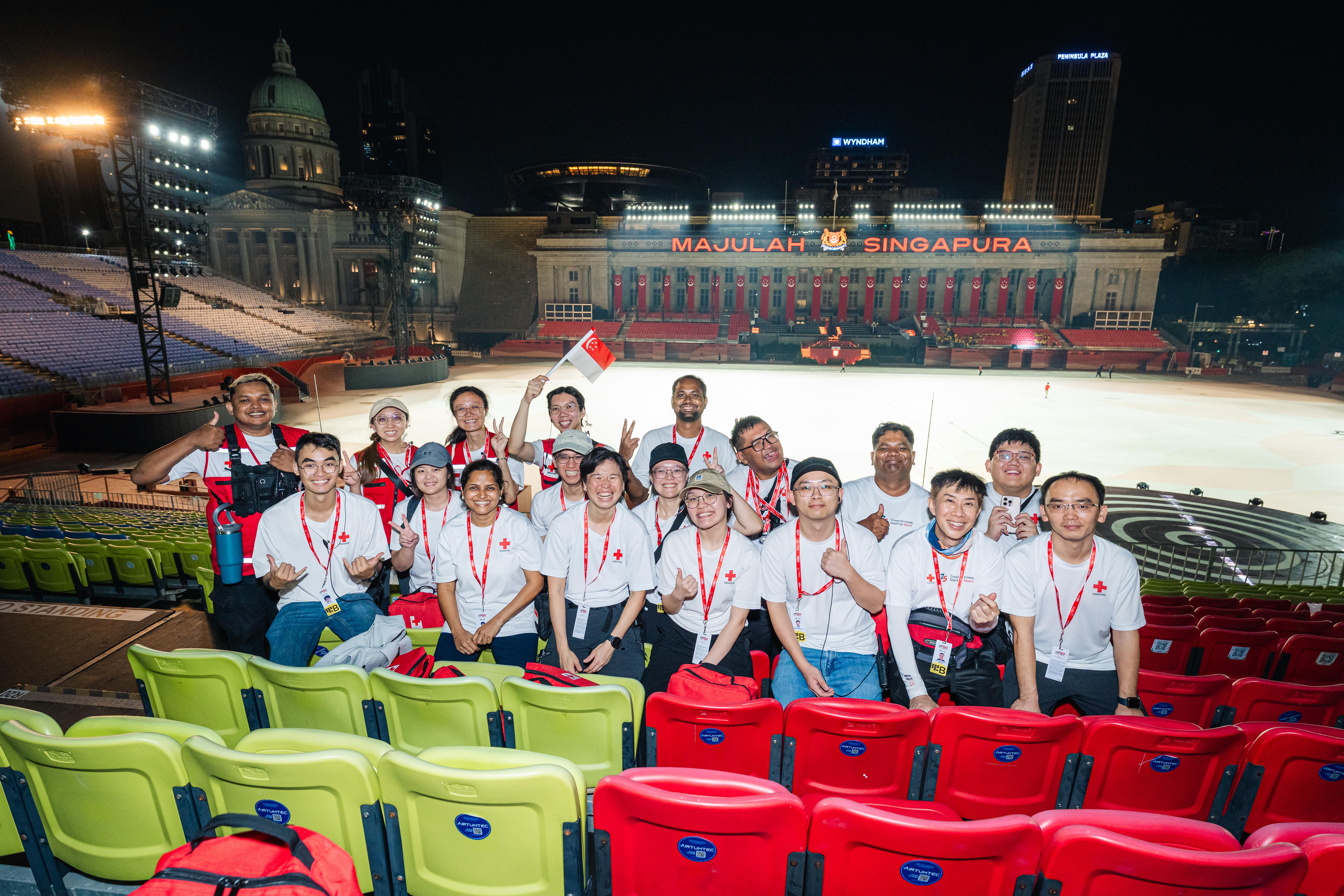
As our nation celebrates 60 years of independence, a deeper focus is being placed on connecting Singaporeans with one another, contributing to our refreshed social compact and showing care for each other. Leading the pack are Volunteers Sylvia and Bernard - two first-aiders who are returning to help out at the National Day Parade.
A year ago, Sylvia was taking a scroll through Instagram when her myResponder app alerted her of a collapse that had occurred just 14 floors below. She raced to the scene where she found the neighbourhood 'newspaper uncle' lying on the ground unconscious. She quickly took charge of the situation by administering CPR and instructed bystanders on how to use the AED. Thankfully, another community responder and two doctors from a nearby clinic soon joined her and they were able to take turns performing CPR and operating the AED. The man’s pulse eventually returned just as the SCDF paramedics arrived.
Sylvia, a recent graduate from NUS, is joined by Bernard, a Software Engineer, to return to the National Day Parade (NDP) as Volunteer Leaders (VL) for events first aid coverage. We interviewed them to find out more about what drives them when it comes to saving lives and contributing to Singapore’s social compact.
Q: What do you do as a Volunteer during NDP?
Bernard: As first aid volunteers at NDP, we are stationed within the audience seating area to look out for casualties, ranging from minor injuries like cuts and abrasions, to major incidents like seizures. Where we can, we render first aid, otherwise we escalate and facilitate evacuation to the medical posts where they can receive a higher level of care.
I’ve been volunteering at the NDP for a few years and as volunteer leaders, our work begins months before the event. We recruit volunteers and organise shift allocations. During each show, we conduct briefings, mentor newer team leaders and first aiders, and coordinate with the NDP medical committee for escalation and evacuation.
Sylvia: As a volunteer leader, I recruit fellow first-aiders, coordinating with the event organisers, and ensuring the welfare of the volunteers on duty.
Pre-deployment, we select first aiders, prepare briefing materials, and allocate them to each of the eight shifts. For each weekly shift, we will invite a VL in charge of another Community Engagement-Community First Aid (CE-CFA) programme to take up a higher level of responsibility — to lead and coordinate our First Aiders on the ground — with Bernard and I supporting them from behind.
During deployment, besides coordinating the different teams, managing volunteers, and helping assess cases, we liaise with the Singapore Armed Forces (SAF) for administrative matters and for the escalation of cases with medical needs beyond Standard First Aid.
Post-deployment, we debrief our first-aiders, which includes going through the cases that happened so that everyone can learn from them, and collecting and filtering through feedback on the shift. We collate the relevant feedback and a case summary to be submitted to the Singapore Armed Forces.
Q: Have you ever saved a life or carried out Standard First Aid on or off duty?
Sylvia: Off-duty, I encountered two incidents near my home where I applied CPR and AED - one in 2023 and 2024. In both incidents, I applied what I have learnt from CPR and AED training from Singapore Red Cross Academy to engage bystanders and do my best to save the life of the unconscious person. However, I was only able to save the person in 2023 but not in 2024.
On-duty, I have been able to render first aid and support my fellow volunteers when they are doing the same. I have directed the injured and unwell to seek medical attention when needed, which I believe are equally important.
As I learnt during Standard First Aid training, we seek to preserve lives as well as promote comfort and recovery for those in need. In this regard, even if no lives were “saved”, applying First Aid and advising members of the community to get the next level of care is integral for the lives of others.
Q: What are some of your favourite things about being at the NDP rehearsals?
Bernard: Each week, the audience is very different, which brings different energies. During the NDP National Education shows, it is always a delight to hear the Primary Five kids singing along to the National Day songs with such passion. It’s also a joy to hear them scream whenever a famous celebrity like Benjamin Kheng appears. I also love when the big national day flags are being flown.
Q: When you're stationed at the National Day Parade rehearsals , watching thousands of Singaporeans celebrate together, what goes through your mind?
Sylvia: My immediate thought is that it is moving to see so many people in Singapore setting aside time to gather and celebrate how far we have come as a nation. I recognise that we are in uncertain times and many people — including my peers and I —- have anxieties over work and the cost-of-living.
Given that we are beset with such concerns, seeing my fellow Singaporeans coming together to celebrate Singapore’s 60th birthday in spite of their struggles reminds me that we have much to be grateful for. We can remain hopeful in the midst of uncertainty.
Q: After a long day of being on your feet, dealing with the heat and the crowd, what keeps you coming back week after week?
Bernard: I find it very meaningful when we can provide a good experience for our first aiders. We are performing a duty for the community, but ultimately our first aiders are volunteers, sacrificing their whole day on a Saturday. It is also quite tiring to be standing on duty under the hot sun or pouring rain. Hence, we can never take their service for granted. I always strive to improve the volunteering experience, by taking care of their welfare, listening closely to their feedback, and smoothening out administrative processes.
Apart from that, I also understand the importance of our role and do not take our responsibility lightly. In the event of a medical emergency among the audience, it is up to us to quickly alert the evacuation team, clear pathways amidst the crowd to ensure they can arrive and evacuate efficiently, and also perform any immediate intervention (e.g. CPR) in the meantime. We try to emphasise this through the practice of conducting casualty evacuation simulations onsite, to ensure our first aiders are prepared for the worst case scenario.
Q: When you're wearing the Singapore Red Cross emblem at NDP, do you feel you're representing something larger than yourself? Can you describe that feeling?
Sylvia: I do. To put it into words, I feel that I am a part of a meaningful legacy of volunteers who have dedicated their time and effort to provide relief and mitigate suffering within our community. I recently learnt that the Singapore Red Cross had provided First Aid services at our first National Day Parade at the Padang in 1966 and I am proud to do the same six decades on. They were called the Voluntary Aid Detachments (VAD) back then (see photo below). I recognise that the opportunity to support the National Day celebrations is a privilege and hope our efforts this year will allow us to maintain this legacy of service for future volunteers.

Source: 30th Anniversary 1952-1982 Souvenir Magazine Voluntary Aid Detachments Division, Singapore Red Cross Society. Available at National Library Level 11 Reference Library
Q: What does patriotism mean to you, and how does volunteering during National Day express that?
Bernard: Just coming together to recite the pledge and sing the national anthem as one united people.
Sylvia: Patriotism means recognising that Singapore is not perfect but still deserving of our best. To how this connects with volunteering during National Day, it goes back to my volunteering experiences. When we volunteer at the Padang, we are required to work with various stakeholders and engage people from all walks of life. Not all of these interactions are pleasant — some people may be rude or demanding. In spite of this, I know that I should put my best foot forward for these stakeholders during my service. This is because I am proud to call Singapore my home and my actions should reflect this, come what may.
Q: How has serving at NDP changed your perspective on what it means to be Singaporean? And, if you could tell every Singaporean one thing about what you've learnt from serving your community — what would it be?
Sylvia: It reinforced my existing perspective that Singapore is a place I call home, for which I am grateful, and can express this gratitude by giving back.
Through serving the community, one thing I have learnt and hope to share with others is that when we help people, we should do so with humility.
As a volunteer first aider, most of my time is spent doing mundane tasks, namely addressing enquiries from community members and putting on plasters for cuts and scrapes. These actions are hardly recognised as impactful, compared to how Standard First Aid is generally depicted (e.g., saving lives with CPR, stabilising the severely injured).
Be that as it may, I take my duties seriously as it matters to those who need them, instead of fretting about whether my efforts are worthy of recognition.
What has helped me to get to this point is finding that personal meaning in my service to others. This is what I have fallen back on over the past two years, regardless of whether I receive external validation for my efforts or not.
Q: As Singapore approaches her seventh decade, what hopes do you have for the role of volunteerism in our society?
Bernard: I hope there can be better systemic support to lower the barriers for Singaporeans to volunteer, whether it be government intervention or corporate support. For example, there are companies that offer paid volunteer time off in addition to annual leave entitlements to allow employees to volunteer for their choice of organization while maintaining a healthy work life balance.
I also hope that organizational beneficiaries of volunteering can better appreciate volunteers if they have the necessary resources to do so. Even the simple act of providing drinks and snacks makes our volunteers feel super motivated!
Sylvia: I recognise that being able to volunteer is a privilege as it means that my basic needs are met and I am not overwhelmed by other important commitments — namely breadwinning and caregiving. I also believe that volunteerism in Singapore acts as a means for those who can afford to set aside time to seek personal fulfillment while serving causes and/or beneficiaries as needed. Considering these two points, I believe that the role of volunteerism will not change. Still, I hope that others in a similar position will volunteer.
Photos by Tay Han Yang, volunteer photographer



